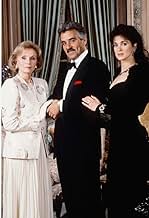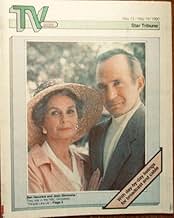When the daughter of a wealthy scriptwriter and socialite is murdered, he feels let down by the courts, so he decides to use his powerful position to enable his own form of justice.When the daughter of a wealthy scriptwriter and socialite is murdered, he feels let down by the courts, so he decides to use his powerful position to enable his own form of justice.When the daughter of a wealthy scriptwriter and socialite is murdered, he feels let down by the courts, so he decides to use his powerful position to enable his own form of justice.
- Won 1 Primetime Emmy
- 1 win & 2 nominations total
Meg Gibson
- Violet Bastito
- (as Margaret Gibson)
- Director
- Writers
- All cast & crew
- Production, box office & more at IMDbPro
Storyline
Did you know
- TriviaTeri Polo's debut.
- GoofsThe butterflies released at the Renthall's ball are clearly animated. They are replaced in close shots by stiff silk models.
- Quotes
Ruby Nolte Renthall: [Indicating the suit she's wearing] Very Lil altemus, don't you think?
Gus Bailey: Very. If that's what you want.
- ConnectionsFeatured in The 42nd Annual Primetime Emmy Awards (1990)
Featured review
This mini-series came out the same year as Bonfire of the Vanities, and it is a similar tapestry of fashionable Manhattan with all the contemporary themes and topics woven in - homelessness, dubious charities, insider trading, anti-gay prejudice, born-again Christians, and the regulation English gossip-columnist.
The opening section also suggests a touch of Sidney Sheldon, always giving you someone to hate, in this case a violent murderer putting the blame on his young female victim and making a churchy appeal for clemency. "I just hope they can forgive me. God has." So has a very spiritual girl who can see him only as a lost sheep in need of salvation, which may yet shorten his sentence. But the victim's father, Gus, has certainly not forgiven him, as he lays a white rose on her grave. "It's not over yet, Becky."
Gus is played by Ben Gazzara - a good face, reflecting many emotions, from inflexible determination to whimsical wonder, while the divorced mother, Ruby, whose complex private life impacts deeply on the plot, is played by the glamorous Connie Sellecca. An incredibly well-kept Eva Marie Saint makes her long-awaited return to the screen as the super-snob, repudiating her son when it's clear he's dying of AIDS (not for "people like us"), yet still presiding over a grand fundraising banquet for AIDS charities. And Jean Simmons lends elegance and grace to the role of the grandmother.
No fewer than 53 featured players make it a little hard to focus on who's who in the zoo, and I wish I could have understood the business with the butterflies swarming round the chandelier, apparently significant. But overall, it's a deeply involving narrative, made more authentic by its background: scriptwriter Dominick Dunne had actually lost his own daughter under these same harrowing circumstances.
The opening section also suggests a touch of Sidney Sheldon, always giving you someone to hate, in this case a violent murderer putting the blame on his young female victim and making a churchy appeal for clemency. "I just hope they can forgive me. God has." So has a very spiritual girl who can see him only as a lost sheep in need of salvation, which may yet shorten his sentence. But the victim's father, Gus, has certainly not forgiven him, as he lays a white rose on her grave. "It's not over yet, Becky."
Gus is played by Ben Gazzara - a good face, reflecting many emotions, from inflexible determination to whimsical wonder, while the divorced mother, Ruby, whose complex private life impacts deeply on the plot, is played by the glamorous Connie Sellecca. An incredibly well-kept Eva Marie Saint makes her long-awaited return to the screen as the super-snob, repudiating her son when it's clear he's dying of AIDS (not for "people like us"), yet still presiding over a grand fundraising banquet for AIDS charities. And Jean Simmons lends elegance and grace to the role of the grandmother.
No fewer than 53 featured players make it a little hard to focus on who's who in the zoo, and I wish I could have understood the business with the butterflies swarming round the chandelier, apparently significant. But overall, it's a deeply involving narrative, made more authentic by its background: scriptwriter Dominick Dunne had actually lost his own daughter under these same harrowing circumstances.
- Goingbegging
- Jan 13, 2021
- Permalink
Details
Contribute to this page
Suggest an edit or add missing content








































